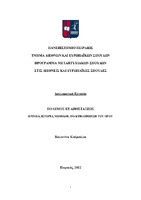| dc.contributor.advisor | Liaropoulos, Andreas | |
| dc.contributor.advisor | Λιαρόπουλος, Ανδρέας | |
| dc.contributor.author | Koumoulou, Valentina | |
| dc.contributor.author | Κούμουλου, Βαλεντίνα | |
| dc.date.accessioned | 2022-07-01T10:11:53Z | |
| dc.date.available | 2022-07-01T10:11:53Z | |
| dc.date.issued | 2022 | |
| dc.identifier.uri | https://dione.lib.unipi.gr/xmlui/handle/unipi/14434 | |
| dc.identifier.uri | http://dx.doi.org/10.26267/unipi_dione/1857 | |
| dc.description.abstract | Ο πόλεμος εξ αποστάσεως αποτελεί μια σχετικά νέα έννοια του πολέμου, η οποία έχει αλλάξει σημαντικά την αντίληψη της ένοπλης σύγκρουσης. Μετά τις επιθέσεις της 11ης Σεπτεμβρίου και το αφήγημα του Πολέμου κατά της Τρομοκρατίας, όπλα όπως
Μη Επανδρωμένα Εναέρια Οχήματα, κοινώς ονομαζόμενα drones, Αυτόνομα Οπλικά Συστήματα και επιθέσεις στον κυβερνοχώρο, έχουν παίξει σημαντικό ρόλο στην καταπολέμηση της τρομοκρατίας. Ωστόσο, αυτή η μέθοδος πολέμου έχει προσελκύσει αρκετή κριτική λόγω της μυστικότητας και της έλλειψης διαφάνειας γύρω από την έννοια. Το πεδίο του εξ αποστάσεως πολέμου δεν έχει ακόμη αναλυθεί διεξοδικά με σκοπό να γίνουν κατανοητές όλες οι επιπτώσεις της τακτικής του, καθώς και τα αφηγήματα που παρουσιάζονται υπέρ ή κατά την χρήση του. Η ανάλυση περιεχομένου κρίθηκε ως η καταλληλότερη ερευνητική μέθοδος για την παρούσα εργασία, δεδομένου ότι το εμπειρικό μέρος αποτελείται από πολιτικούς λόγους όπου κύριος στόχος είναι να πεισθεί το κοινό για τη νομιμότητα και την ακρίβεια του πολέμου με τη χρήση drone. Στόχος της παρούσας εργασίας είναι να παρουσιάσει την πραγματικότητα του εξ αποστάσεως πολέμου από κάθε άποψη, είτε όσον αφορά την ιστορία, το νομικό πλαίσιο, είτε την ηθική, προκειμένου να υπάρξει πλήρης κατανόηση των λόγων πίσω από ορισμένα αφηγήματα που φαίνεται να προωθούνται από αξιωματούχους. | el |
| dc.format.extent | 116 | el |
| dc.language.iso | en | el |
| dc.publisher | Πανεπιστήμιο Πειραιώς | el |
| dc.rights | Αναφορά Δημιουργού-Μη Εμπορική Χρήση-Όχι Παράγωγα Έργα 3.0 Ελλάδα | * |
| dc.rights.uri | http://creativecommons.org/licenses/by-nc-nd/3.0/gr/ | * |
| dc.title | Remote warfare - Concept, history, methods, politicization of the term | el |
| dc.title.alternative | Πόλεμος εξ αποστάσεως - Έννοια, ιστορία, μέθοδοι, πολιτικοποίηση του όρου | el |
| dc.type | Master Thesis | el |
| dc.contributor.department | Σχολή Οικονομικών, Επιχειρηματικών και Διεθνών Σπουδών. Τμήμα Διεθνών και Ευρωπαϊκών Σπουδών | el |
| dc.description.abstractEN | Remote warfare constitutes a relatively new concept of war that has significantly changed the
perception of conflict. Since the 9/11 attacks and the War on Terror narrative, weapons such as
Unmanned Aerial Vehicles, commonly named drones, Autonomous Weapons Systems, and
cyber-attacks, have played a crucial role in fighting terrorism. However, this method of warfare
has attracted much criticism due to the secrecy and lack of transparency surrounding the
concept. The field of remote warfare has yet to be analysed thoroughly in order to understand
all the implications of its tactics as well as the narratives that are presented in support or against
its use. Content analysis was deemed as the most appropriate research method for this paper,
given that the empirical part constitutes of political speeches where the main goal is to convince
the public of the legitimacy and precision of drone warfare. The aim of this paper is to present
the reality of remote warfare in every aspect, either with regard to history, legal framework, or
ethics, in order to have a complete understanding of the reasons behind certain narratives
promoted by officials. | el |
| dc.contributor.master | Διεθνείς και Ευρωπαϊκές Σπουδές | el |
| dc.subject.keyword | Remote warfare | el |
| dc.subject.keyword | Drone | el |
| dc.subject.keyword | Autonomous weapon systems | el |
| dc.subject.keyword | Clean warfare | el |
| dc.subject.keyword | Narrative | el |
| dc.subject.keyword | Dehumanisation | el |
| dc.date.defense | 2022-06-27 | |



